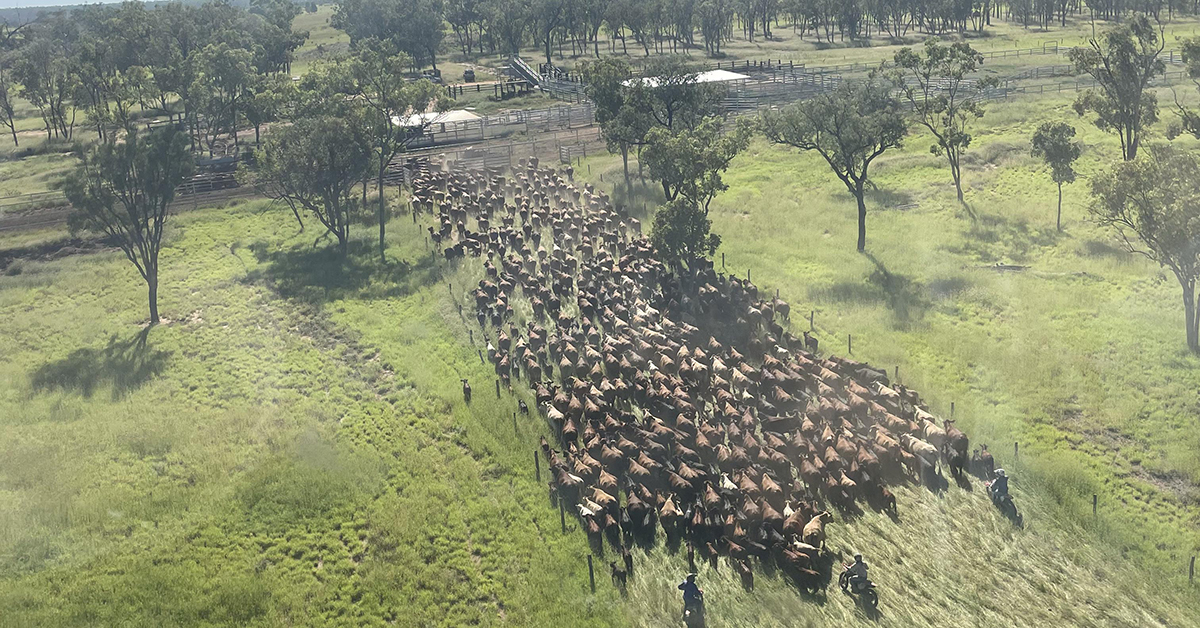Quality Angus genetics prove their worth in tough northern conditions


Using Angus genetics in their large-scale northern beef operation has added weight gain and fertility to the Appleton Cattle Company’s herd, helping them to produce an ideal steer for the organic market.
Fred and Loid Appleton and their families run the Appleton Cattle Company breeding and fattening business, which covers more than two million hectares across Queensland, with properties in the state’s central and northern regions, as well as channel country in the south-west.
Always striving to improve the quality of their herd, Fred Appleton introduced Angus bulls to their mix of sires about 10 years ago and continues to be impressed with the breed’s maternal attributes, hardiness, growth and carcase traits.
“Initially we decided to trial Angus bulls over our Droughtmaster cows and were really pleased with the results,” Mr Appleton said.
“We’re getting an improved pregnancy rate and the weaners are visually sappier and fatter.
“But most importantly, due to the increase in weight gain, the turn-off of our steers is about six months earlier and returning a higher carcase weight on the hook.”
Mr Appleton has continued to join the Angus to his Droughtmaster cows, as well as some Santa Gertrudis, and is moving towards running a dominant Angus herd on their properties in the Alpha district and at Naryilco Station near the border with NSW.
The northern cross breeding operations are a mix of Brahman, Simmental and Charolais, while a Shorthorn-cross is run on the channel country near Bedourie.
“Our long-term aim is to continue to increase our Angus content within our breeding operations and we have been keeping a portion of the Angus-cross heifers and joining them back to Angus bulls as part of the program,” Mr Appleton said.
“The desired result will be having around 10,000 predominantly Angus breeders in the business.
“Another advantage with the Angus-cross females is that they are maturing earlier, so we can join them at a younger age, which in turn is providing a faster return on calving results.”
Appleton Cattle Company has been buying its Angus bulls from Qld-based studs, Bulliac Angus at Miles, and Bauhinia Park near Emerald, with a focus on frame size, growth, and carcase attributes.
“We keep our bull selection pretty simple, I don’t get carried away by performance figures,” Mr Appleton said.
“We want big, growthy bulls that have a good fat coverage to assist in producing our end product, an organic bullock on the hook that is meeting high Meat Standards Australia grading.
“We want to achieve our target weights in a short space of time.
“I will look at 600-day weight and also target fat cover to make sure they’re not just a big, raw-boned animal as a two- year-old.”
Mr Appleton said sourcing their Angus genetics from local seedstock producers ensured the bulls could handle a range of environmental conditions and “stood up well” in their country.
To help meet their annual Angus bull requirements, Appleton Cattle Company has also established a small herd of 100 registered Angus cows to supply a portion of home-bred bulls for their commercial herd.
Under the management of Mick Busby, recent bull purchases include Bulliac Nintendo N130 and Spry’s W-Paratrooper R601. An annual artificial insemination program is also carried out using leading Angus genetics including Texas Iceman R725, from Macka’s Angus.
The company has also introduced a controlled breeding program. The cows are joined for four months from January through to April, with the first calves hitting the ground in September.
“As we are getting more and more Angus influence coming through in the breeders, the herd quality has improved, particularly in both our conception and calving rates,” Mr Appleton said.
“The cows are pregnancy tested each year and any empty cows and heifers are sold which continues to help lift the fertility of our herd.”
Depending on the season, the calves are weaned through June and July and fattened on their highly productive buffel grass country at Alpha.
In an effort to open up more market options, the Appleton Cattle Company became certified organic in 2014, and consistently receive a premium for their steers, with the majority going to Arcadian Organic and Natural Meat Co.
“It was an easy change for us as we were already operating organically in many ways,” Mr Appleton said.
“It has been a great opportunity for our company and greatly assisted our business’s growth in recent years.
“If we can get a young animal in that two to 2.5 year-old bracket at a carcase weight of 330 to 340kg with good fat cover, it means we’re producing a quality animal for the organic market.
“The Angus breed has given our operation fertility, weight for age, fat cover and uniformity and if the weather fails, we have a backup plan as you can get a premium for an Angus-cross feeder steer as opposed to a Brahman.”
Appleton Cattle Company is looking forward to being part of the 2025 Neogen World Angus Forum, which is being held in Brisbane, Qld, in May 2025. As part of the conference program’s extensive post-tour event, Fred and Anna Appleton will host visitors to Islay Plains Station, Alpha.
“We are excited to be part of the post-tour event,” Mr Appleton said.
“We are looking forward to hosting the tour, sharing our part of the world and showcasing the success the Angus breed is having in a natural, organic, grass-fed environment, and what that means for
our business.”
– Kylie Nicholls, National Agricultural Features ACM